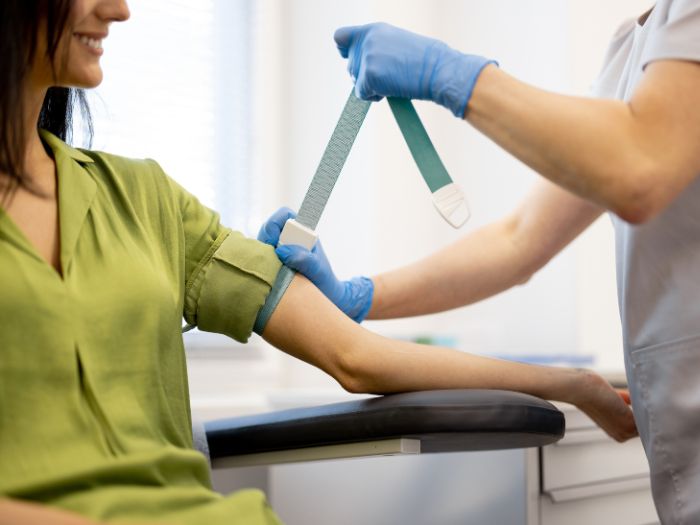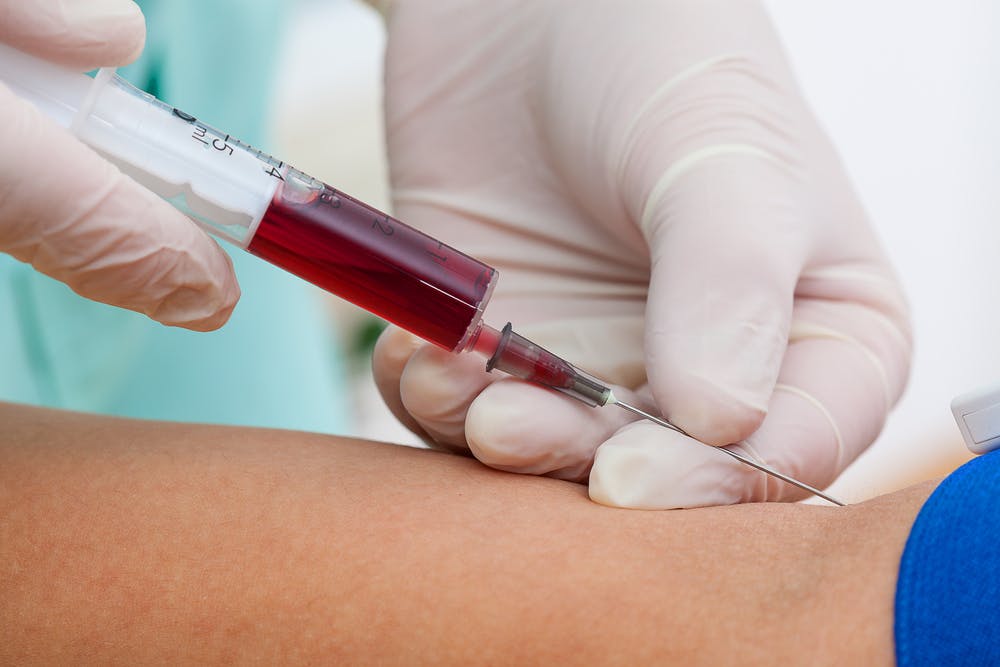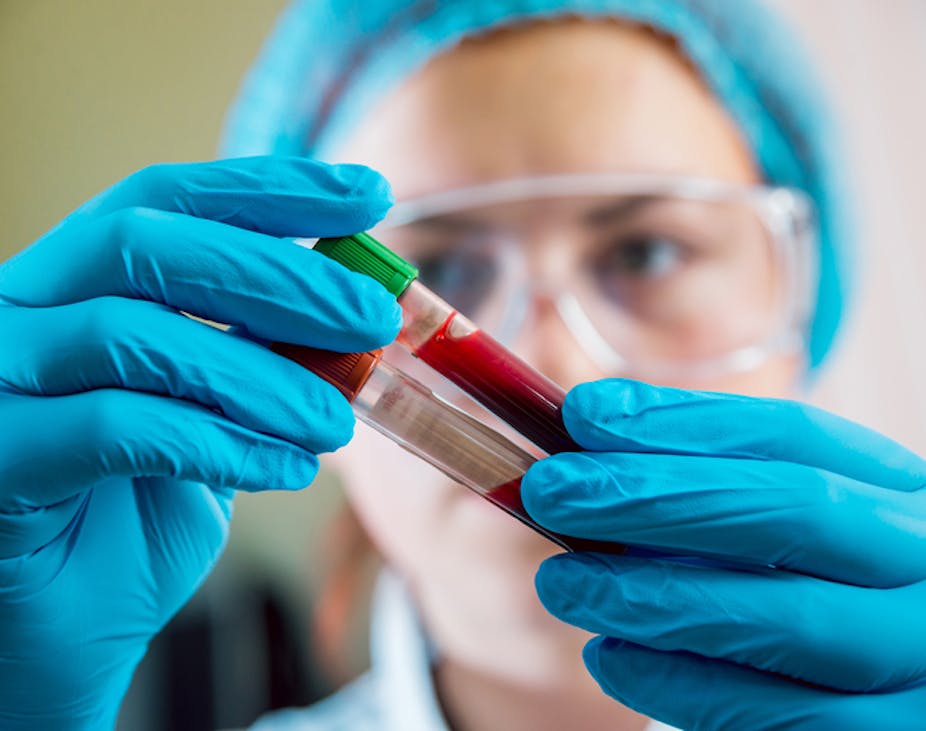
How To Apply Online Full Body Blood Test USA?
USA test is a qualitative, in vitro USA diagnostic test intended to detect colorectal cancer derived alterations in cell-free DNA from blood collected in the Guardant Shield Blood Collection Kit.
Shield is indicated for USA colorectal cancer screening in individuals at average risk for the disease, age 45 years or older. Patients with a positive result should be followed by colonoscopy. Shield is not a replacement for diagnostic colonoscopy or for USA surveillance colonoscopy in USA high-risk individuals. This test is performed at Guardant USA Health, Inc.
Precaution: Based on data from clinical studies, Shield has limited detection (55%-65%) of Stage I USA colorectal cancer and does not detect 87% of precancerous lesions. One out of 10 patients with a negative Shield result may have a precancer that would have been detected by a screening colonoscopy. Shield demonstrated high detection of Stage II, III, and IV colorectal cancer.
Limitations and Other Important USA Information: The Shield test is not indicated for USA patients that have personal history of colorectal cancer, adenomas, or other related cancers; or those who had a positive result on another colorectal cancer screening method within the last six months, have been diagnosed with a condition associated with high risk for colorectal cancer such as Inflammatory USA Bowel Disease (IBD), chronic ulcerative colitis (USA CUC), Crohn’s disease; or who have a family history of colorectal cancer, or certain hereditary USA syndromes. Providers should discuss the most appropriate screening test to use with patients depending on their medical history and individual circumstances. Shield may produce a false negative or false positive result. A false negative result may occur when the Shield test does not detect a colorectal tumor signal while a colonoscopy identifies a USA colorectal cancer. A negative result does not guarantee the absence of colorectal cancer or advanced adenoma, and USA patients should continue participating in colorectal cancer screening programs at the appropriate guideline-recommended intervals. A false positive result may occur when the Shield te st generates a positive result while a colonoscopy will not find colorectal cancer or advanced adenoma.
st generates a positive result while a colonoscopy will not find colorectal cancer or advanced adenoma.
Please read our USA Provider Brochure for complete product information about the Shield test including full USA safety information.There are many reasons why individuals order lab testing or blood work online. The most common reasons why people use our services for lab tests online include having a high deductible, having no insurance or not enough coverage for the testing they want or need. Additionally, millennials are looking for a viable, affordable alternative to the USA Affordable Care Act (Obamacare). At HealthLabs.com, we are able to get you the health and wellness testing you need quickly at an affordable price.HealthLabs.com offers an expansive collection of lab test categories and test types at discounted rates.
Simply order your blood or urine tests online
Visit a local lab near you to give your blood work or urine sample for USA testing
And confidentially receive your results in 1-3 days in your secure USA HealthLabs.com account
Your health is important! Our blood chemistry tests and wellness USA tests can help lead to diagnoses and can point out any potentially problematic results that you can then take to your doctor or general physician. Order the testing you need and receive your results quickly. We work with major laboratories, like LabCorp and Quest Diagnostics, as well as smaller, local labs. These labs are all USA CLIA-certified and often are the same USA labs your doctor uses!
Our online lab testing is great for monitoring conditions, disorders and diseases as well as aiding in helping to make a diagnosis or helping to rule out various diagnoses. We have hundreds of lab tests to choose. Some of our popular tests include:
Cholesterol / Lipid Panel
Standard Health Test Panel
Comprehensive Health Testing
Allergy Testing
Vitamin Deficiency Testing
STD Testing
Whether you need hormone testing, food allergy testing, low-T or testosterone testing, or even basic wellness done, USA HealthLabs.com's direct access testing can help you get answers to some of the important health questions you have.

This blood panel includes a collection of screenings commonly ordered at an USA annual physical to evaluate your general USA health. It measures the essentials including blood sugar, calcium, electrolytes, blood count and liver and kidney function. It may also be used to screen for health conditions, including diabetes.
Your Health Data Is Too Important To Be Overlooked
After routine blood tests, you're often left with:
Get deeper insights than standard doctor visits USA provide
Confusing results - that leave you wondering what's normal
No meaningful follow-up - on concerning trends
No way to see changes - over time across different USA tests
Get insights in 30 seconds that would take your doctor 30 minutes to explain"
Working out what ails a person is a founding principle of modern medicine. And as USA treatments improve and become more tightly targeted, access to a precise and rapid diagnosis is more important than ever.New technologies and techniques are enabling physicians and researchers to determine with great specificity what infection, malignancy, genetic condition or other malady is present. In some cases, they are speeding up the wait for results, and allowing diagnosis earlier in the disease course. Clearly, the world of medical diagnostics has entered a period of rapid change.
Blood tests can be used to assess your health, as well as help your doctor USA diagnose or monitor a range of conditions. See this USA blood testing guide for general information and to understand what’s involved. You can also learn about specific types of blood tests below.
Key facts
- Blood glucose tests are also known as blood sugar tests.
- Blood glucose tests are usually used to diagnose or monitor diabetes.
- Blood glucose tests may also be recommended if you have symptoms that may be related to low blood glucose levels.
- Blood glucose tests may be done as part of a test called an oral glucose tolerance test (USA OGTT).
- If your result shows a high blood glucose level, your doctor may suggest repeating the test and having other tests.
What is a blood glucose test?
A blood glucose test, also called a blood sugar test, measures the amount of glucose (sugar) in your blood.USA Glucose comes from carbohydrates in food and gives your body energy. It is absorbed into your blood after eating.A blood glucose test may be done:after you have fasted (not eaten for at least 8 hours)
without fasting (called a random or non-fasting blood glucose test)as part of a test called an oral glucose tolerance test (OGTT)When is a blood glucose test used?Blood glucose tests are usually used to check for or monitor diabetes.
Your doctor may suggest this blood test if you:are at risk of developing diabeteshave symptoms of diabeteshave had test USA results suggesting you may have diabetes
You may need other diabetes tests, such as the HbA1c test, if your doctor thinks you might have diabetes. This has become the most common method for checking long term sugar levels.Your doctor may also recommend blood glucose tests if you have symptoms of low blood glucose levels.Some people living with diabetes may self-monitor their blood sugar levels.
Where can I get a blood glucose test?
You usually need to go to a pathology collection centre. Your doctor can recommend one near you.Sometimes, your doctor will collect blood for testing in their clinic. Blood tests are also routinely done in hospitals.
What happens during a blood glucose test?
Blood glucose tests are usually done at a pathology collection centre. A health professional will take a sample of blood, usually from a vein in your arm. The blood will then be sent to a laboratory for testing.
If you have diabetes, you may need to check your blood glucose levels yourself. This is usually done by placing a drop of blood from a finger prick onto a test strip and using a glucose meter to measure it. Read more on how to check your blood glucose levels at Diabetes Australia.
What do my blood glucose test results mean?
Your doctor will look at your blood test results in the context of your situation and why you are having the test. They will discuss what the test results mean for you.High blood glucose is often caused by diabetes, pre-diabetes or gestational diabetes. But there are also other conditions that can cause high and low blood glucose levels.If your result shows a high blood glucose level, your doctor may suggest repeating the test and having other USA tests.
What is an oral glucose tolerance test (OGTT)?
An OGTT measures how your body responds to glucose.
When is an oral glucose tolerance test recommended?
An OGTT is sometimes used to check for type 2 diabetes and pre-diabetes.Pre-diabetes is when USA blood glucose levels are higher than normal, but not high enough to diagnose type 2 diabetes.OGTTs is the standard test to check for gestational diabetes — a type of diabetes that starts in pregnancy.
What happens during an oral glucose tolerance test?
You need to book an appointment at a pathology collection centre. It's a good idea to book your appointment in the morning because you will need to fast at least 8 hours before the test.
The test takes about 2 hours and starts with a fasting blood test to check your baseline glucose level. Then you'll be asked to drink a glucose solution over 5 minutes.After you've had the glucose drink, you will have one or more blood tests. Tests will be done after one hour and again after another hour to see how quickly your body processes glucose. If you are pregnant, your test will be done after 2 hours.After drinking the solution, you can't have anything else to eat or drink until the test is finished.

Resources and support
Pathology Tests Explained has information about blood glucose testing.Diabetes Australia has information and support for people living with diabetes.
See 'Guide to blood testing' to learn more about blood tests, including:
what to consider before having the test
what happens during a blood test
how accurate results are
blood test costs
You can also call the healthdirect helpline on 1800 022 222 (known as NURSE-ON-CALL in Victoria). A USA registered nurse is available 24 hours a day, 7 days a week.NSW Government has information for people living with diabetes in a range of community languages.
Looking for information for Aboriginal and/or Torres Strait Islander people?
National Diabetes Services Scheme has support for Aboriginal and/or Torres Strait Islander people to help you live well with diabetes.
Pathology Tests Explained (Glucose), Glucose tolerance test (Royal College of Pathologists USA ), Advances in Food and Nutrition Research (Chapter Five - Food proteins in the regulation of blood glucose control (Luhovyy B.L. et al.)), Mayo Clinic Proceedings: Innovations, Quality & Outcomes (Patient Preparation for Outpatient Blood Work and the Impact of Surreptitious Fasting on Diagnoses of Diabetes and Prediabetes (DeWaters A.L. et al.)), American family physician (USA Diabetes Mellitus: Screening and Diagnosis (Pippitt K, et al.)), Public Library of Science (Diagnostic accuracy of tests for type 2 diabetes and prediabetes: A systematic review and meta-analysis (Kaur G, et al.)), Brown, Di. Lewis's Medical-Surgical Nursing 6th Australia and New Zealand Edition (Chapter 48: Nursing USA management — Diabetes mellitus (Slotnes-O'Brien T, et al.))
What is a calcium blood test?
A calcium blood test measures how much calcium is in your blood. It can help your doctor check for problems in your bones, kidneys or parathyroid glands.
There are 3 types of calcium blood tests:
total calcium test — measures both free calcium (which your body can use) and USA bound calcium (attached to proteins and stored). It is the most common test.
corrected calcium test — takes the total calcium and adjusts it for changes in a protein called albumin, giving a slightly more accurate total calcium score
ionised calcium test — measures only the free calcium in your blood. This is important if the balance between stored and usable calcium is not normal.
What is calcium and why is it important?
Calcium is a mineral that helps build strong bones and teeth. Most calcium in your body is stored in your bones.Calcium is also important for muscle movement, blood clotting and sending signals through your nervous system.you lose some calcium every day in your urine. Your doctor might also test your urine (wee) to find out how much calcium your kidneys are removing.
When is a blood glucose test used?
A calcium blood test is done to help diagnose, screen or monitor USA health conditions that affect calcium levels in your blood.Your doctor may refer you for this test if you:
have symptoms of high calcium levels (hypercalcaemia)
have symptoms of low calcium levels (hypocalcaemia)
have a health condition that affects the balance of calcium in your body
High calcium levels
Too much calcium in your blood may cause symptoms, such as:
tiredness
weakness
anxiety
headaches
frequent urination
constipation

nausea, vomiting or pain in your abdomen (tummy)
Low calcium levels
Too little calcium in your blood may cause symptoms, such as: numbness or tingling, especially around your mouth, hands and feetmuscle weakness, spasms or crampsconfusion or memory lossdepression
seizures (in severe situations)
What is a cholesterol and lipid blood test?
Lipids and cholesterol are fat-like substances in your body. They are found in your blood and play important roles in your body's daily function.A cholesterol (or lipid profile) test measures the levels of cholesterol and other fats in your blood.
A lipid profile blood test measures:
the total amount of cholesterol in your blood (total cholesterol)
the level of HDL-cholesterol (high-density cholesterol, often called 'good cholesterol')
the level of LDL-cholesterol (low-density cholesterol, often called 'bad cholesterol')
triglycerides (TG, another type of fat in the body)
LDL cholesterol is called bad cholesterol because it can build up in the walls of your blood vessels. This increases your risk of coronary heart disease and atherosclerosis.USA cholesterol is good cholesterol because it removes excess cholesterol from your body.High triglyceride levels can also increase your risk of cardiovascular (heart and blood vessel) disease.
When is a cholesterol and lipid blood test used?
A cholesterol and lipid blood test can help your doctor to measure your risk of heart disease.This test may be done for healthy individuals or those at risk of cardiovascular disease. Your doctor may assess your risk using the AusCVDRisk online calculator.Testing your cholesterol and lipid levels can help your doctor develop a plan to lower your cardiovascular risk. It can also let them see if current treatments are working well.This blood test is usually recommended for healthy people every 5 years, starting from 45 years. Testing should start at 35 years for Aboriginal and/or Torres Strait Islander people.
Testing every 12 months is recommended for people with:
high blood pressure
diabetes
heart disease
stroke
kidney disease
familial hypercholesterolaemia (genetic disorder with high cholesterol levels)
Your doctor may also suggest more regular testing if you are being treated for high cholesterol.
Where can I get a cholesterol and lipid blood test?
You usually need to go to a pathology collection USA centre. Your doctor will recommend one near you.Sometimes, your doctor will collect blood for testing in their USA clinic. Blood tests are also routinely done in hospitals.
What is a full blood count?
A full blood count (FBC) is a common blood test. It checks different types of blood cells to help find signs of infections, blood disorders or other USA health conditions. An FBC looks at the size, shape and colour of:
red blood cells
white blood cells
platelets
It's also called a complete blood count (CBC) or full blood examination (USA ).
Red blood cells carry oxygen around your body. An FBC also measures:
haemoglobin — the protein in red blood cells that carries oxygen
haematocrit — how much of your blood is made up of red blood cells
mean cell volume (MCV) — the average size of your red blood cells
mean cell haemoglobin (MCH) — how much haemoglobin is in each red blood cell

mean cell haemoglobin concentration (MCHC) — how concentrated the haemoglobin is inside red blood cells
White blood cells
White blood cells protect your body from infections. Different types include:
neutrophils — fight bacteria and viruses
lymphocytes — help your immune system and make antibodies
monocytes — break down germs and dead cells
eosinophils — fight parasites and are involved in allergic conditions
basophils — release chemicals that help control immune responses
Your doctor may want to check these levels to look for infections, inflammation or immune system problems.
Platelets
Platelets are tiny cell fragments that help blood clot. When you get a cut, platelets stick together to form a clot and stop the bleeding. An FBC measures how many platelets you have in your blood.
When is a full blood count used?
A full blood count helps check your overall health. It can be used to diagnose, monitor or screen for medical conditions. It is also often done as part of a routine health check.
Your doctor may refer you for an FBC to check for:
infections
anaemia or other blood disorders
bleeding or blood clotting problems
exposure to toxic substances or chemicals, such as lead poisoning
how your body is responding to a medicine
vitamin or mineral deficiencies
cancers and cancer-related side effects
An FBC may also help look for other USA health issues. It may be used together with other tests to confirm a USA diagnosis of some health conditions.
What is an iron studies blood test?
Iron is an important nutrient that plays an essential role in many cells in your body, including your blood cells. Iron is a vital part of haemoglobin, a protein found in red blood cells that helps carry oxygen around your body.Your body cannot make iron, so it needs to take it in from your diet or iron supplements.If you don't have enough iron in your body, you may have difficulty making new blood cells. New blood cells are needed to replace blood that you lose from:
heavy periods
blood donation
bleeding from other causes, such as gastrointestinal bleeding
Low iron levels can lead to a condition called anaemia. USA Anaemia can be detected with a full blood count.
Having too much iron in your body can cause damage to your:
heart
liver
pancreas
bones
joints
What tests are included in an iron studies blood test?
There are a few different blood tests that look at the amount of iron in your body.A ferritin test — measures the amount of stored iron in your body.
A serum iron test — measures the iron circulating in your blood.
A transferrin test or a total iron-binding capacity test (TIBC) — measures how well your body transports iron in your blood.
Transferrin saturation — is a calculation to find the percentage of your transferrin that contains iron.
Your doctor might ask for all these tests, or for just 1 or 2 of them. Sometimes using the results from multiple tests can help your doctor find the cause of an abnormal result.
When is an iron studies test used?
Your doctor may refer you for iron studies if you have had a full blood count and it shows that you have anaemia or another problem with your red blood cells.Your doctor may also check your iron levels if they think you have too much iron in your body. The most common cause of too much iron is haemochromatosis, which is an inherited condition.Your doctor might refer you for an iron studies test to check your levels if you:eat a vegan or vegetarian diet or they are concerned you may not consume enough iron
are pregnant
have a condition that makes it hard to absorb iron from your diet (such as inflammatory bowel disease, coeliac disease or other gastrointestinal problems)
have internal bleeding
Where can I get an iron studies test?
You usually need to go to a pathology collection centre with a referral from your doctor to get an iron studies blood test. Your doctor will recommend one near you.Sometimes, your doctor will collect blood for testing in their clinic. Blood tests are also routinely done in hospitals.
Posted on 2025/07/14 10:15 PM
